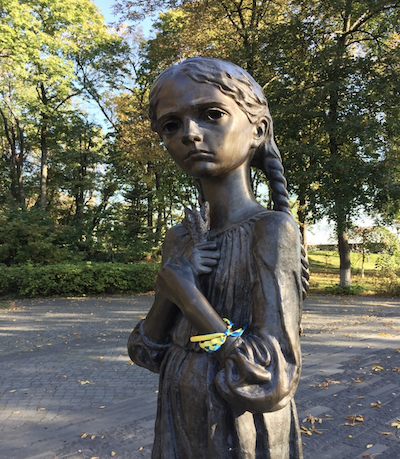2021 IDEA-SHARING ADVENTURE SERIES BY KEVIN HANCOCK
“The world is big and I want to have a good look at it before it gets dark.”
—John Muir
Last week I wrote about the importance of CEOs broadening their roles and seeing the highest calling of free enterprise as the advancement of humanity.
This week I want to call out all of America for becoming self-absorbed.
“Just watch the nightly news,” my friend Pankaj Srivastava said to me as we met via Zoom during the height of COVID-19.
“We’ve become completely self-absorbed as a country,” Pankaj continued. “All you see on the television news is what’s happening right here in America. We’ve lost track of the huge swath of humanity outside our borders and how much more difficult life can be elsewhere. We’re spoiled and we’re self-centered. We can’t see our place in the larger context of humanity anymore.”
In the days following our visit I watched the news and reflected upon what Pankaj had said. He was right. In a thirty-minute nightly news program there might be a minute or two devoted to something beyond our national borders.
Pankaj by nature is an internationalist. Born in India, he emigrated to America, and we first met when I traveled to Kiev, Ukraine, to do some research for my second book on the company he was working for at the time, ZEO Alliance. Pankaj has worked and lived in over two dozen countries, and as a result, sees America in a broader context than someone who has only ever lived here.
“We’ve lost track of how the rest of the world works,” Pankaj said. “The despots, the totalitarians, the corruption, the starvation, the wars, and the poverty that exist in so many places have become distant to us. We’re only thinking about ourselves.”

Approximately 7.84 billion people share Planet Earth, and 96 percent of them do not live in America. The generally fortunate 4 percent that live here combine to produce, create, invent, consume, and enjoy 16 percent of the total planet’s economic output, while consuming 20 percent of the world’s oil. That’s our economic might.
Improving economic conditions for all Americans should always be a priority, but it’s important to see that work in a global context. In 2020 the median income level in the United States is $63,240. In China, it’s $10,410. Median income in Vietnam is $2,540, Pakistan, $1,530, and Congo, $520 (www.worlddata.info/average-income.php). Additionally, 700 million people globally live in “extreme” poverty, surviving on $1.90 per day or less. Around the world, 25,000 people die daily from hunger or hunger-related causes. Billions of people worldwide live in autocratic, corrupt, or semi-lawless societies.
And what would all these people, living in more tenuous circumstances than our own, ask from us collectively as American’s?
I think the answer, at its most human level, would be for us to truly see them, and correspondingly, to see ourselves in a broader context.
Each year, people by the thousands walk from El Salvador to the US border carrying everything they own with the hope of just getting into our country and escaping the extreme poverty, gang violence, and corruption that permeates their homeland.
“I feel lucky to be in this country,” Pankaj said. “It’s the greatest country on Earth.”
This reminded me of yet another conversation I had recently. I was in a taxi in Boston, and the driver was a young African immigrant. A conversation sparked between us as he drove, prompting me to ask him my favorite question.
“What brings you here?” I queried.
“Here you can be free,” he replied in reference to America. “There’s no corruption here. Where I come from there is no democracy, no rule of law. There is only corruption. There are no jobs and no opportunity in my native land. Here there is opportunity.”
Corruption.
This word comes up time and again in my global travels. I was shocked, for example, at how openly pervasive corruption was in Ukraine as a result of decades of Soviet communist rule.
“Corruption is very bad in Ukraine,” my driver Yuri told me as we’d headed from the airport toward downtown Kiev. “Even driving is corrupt here. That’s why there are so many very bad drivers. People pay illegally to get license. Economy not good here—too much corruption for free systems to fully function, but people still live—people still smile.”
The median income in Ukraine is $3,370, yet Yuri is excited about the future.
“We are very great optimists, Ukrainian people,” he told me.
John F. Kennedy once said, “Ask not what your country can do for you; ask what you can do for your country.”
Those words stand the test of time and reverberate with deep relevance today. They might also be morphed into an invitation for America globally.
Ask not America only what you can do for yourself; ask also what you can do for the world.
“America will never be destroyed from the outside. If we falter and lose our freedoms, it will be because we destroyed ourselves.”
—Abraham Lincoln
____________________
Thank you for considering my thoughts. In return I honor yours. Every voice matters. Between our differences lies our future.
____________________